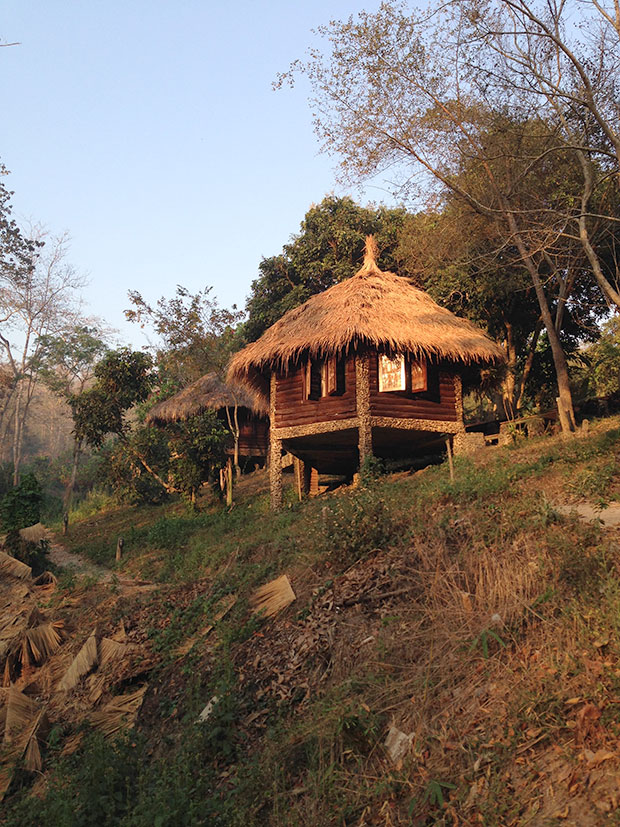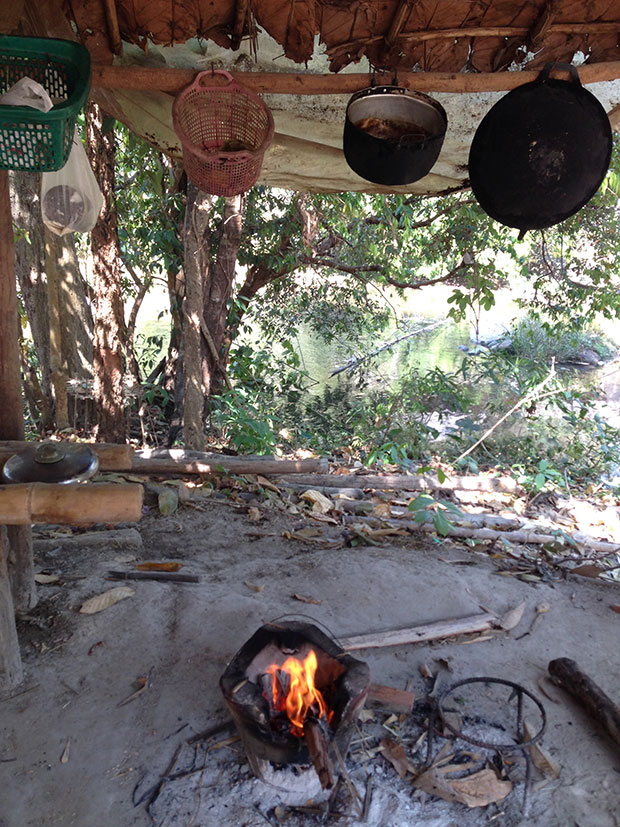CHIANG MAI, May 31 — Her back was cold, coarse and leathery as expected, with a few coarse spikes of hair at the crown. With one hand tightly in the mahout’s palm, I clambered on unsteadily, throwing one leg over the elephant’s neck while keeping my other foot firmly on the wooden platform I had climbed up on earlier. It was a safety anchor, and I would have gladly stayed in that position but this was not an elephant sitting session but a sunrise ride.
I had signed up for the Amazing Mountain Adventure offered by The Chai Lai Orchid (Chai Lai), an eco-resort that shares the riverside jungle space with Phutawan Elephant Camp in Mae Wang, a mountainous region approximately 55 kilometres from Chiang Mai. Meaning “beautiful and strong” in Thai, the resort’s moniker also hints at a bigger purpose: It was set up and managed in partnership with non-profit organisation Daughters Rising, which supports the empowerment of women from nearby refugee communities — mostly Karen hill tribes who had fled from neighbouring Myanmar — who are at risk of being sold into sex slavery.

Daughters Rising provides education and training, equipping the women with skills that enable a future in the hospitality industry. As employees at the resort, they earn decent wages and learn various aspects of its running. The women are also taught English, basic computer know-how, and are made aware of their rights and other relevant issues. By spending your tourist dollars at Chai Lai, whether as a staying guest or day visitor, you contribute to this humanitarian effort.
The other cause that Chai Lai promotes is that of responsible elephant tourism, an issue that has been widely debated, with the ill treatment of these animals at the centre of it and rides frowned upon by many. The resort points out that while all elephants should ideally be wild, Asian elephants have long been domesticated, including most of those found in Chiang Mai today — including at Puthawan — and are therefore not suited to be returned to the wild. Shrinking natural habitat poses another problem.

At Phutawan, each elephant is cared for by a dedicated mahout, whose job is relentless as he has to tend to his assigned brood all day, feeding, bathing, cleaning and interacting with them. The mahouts live on site as they usually start work by 6am and only call it a night after the elephants’ last feeding at 10pm. Man and beast thus develop an intimate bond that’s akin to family, the connection particularly strong between elephants that were born at the camp and have been under the care of the same guardians since birth.
Lati is one of the young mahouts at Phutawan and has two elephants under his care: Tong Wan and her baby, Tang Mo. The former was my ride that cool, misty morning and after I had stabilised myself on her back, Lati gestured for me to lean forward and place my palms just behind Tong Wan’s ears.
That seemed to be the signal she had been waiting off as she ambled towards a pile of sugarcane (her breakfast) with a rather nervous me on her back, praying silently and willing my body to adapt to the uneven rocking. I clenched my inner thigh muscles — thank God for regular Pilates workouts! — and let my legs hang loosely. Every time Tong Wan moved, shifting from one front leg to the other, my hips mimicked the motion.

With Tang Mo by her side, mother and daughter munched on the stacks of sugarcane, curling their agile trunks around the sticks and lifting them into their mouths in one swift gesture.
Lati then instructed Tong Wan to start moving towards a hilly bamboo forest at the back of Chai Lai where a well-trodden path winds past thickets and the resort’s rustic villas, which range from quaint thatched huts to riverside suites with spacious balconies where you can have a Thai massage.
Tong Wan barely seemed to notice me on her back; she moved at her will, stopping occasionally to nibble at the bushes or feed Tang Mo, and straying off the trail at times. Lati, who walked next to us, would shout out a command in Thai and guide her back on course. I had a feeling Tong Wan is a bit of a cheeky one, and her relationship with Lati is like that of a petulant child and a strict but loving father.
Sitting atop Tong Wan, I enjoyed an elevated view of the surroundings, taking in the stillness of the morning as the sun slowly lit up the sky. The air was crisp and fresh. We pass a reservoir where the elephants drink from and sometimes take a soak in.
Tong Wan kept things interesting, alternating between leisurely strolls and quick trots, which meant that I had to constantly watch my balance to accommodate the changing pace. I realised that this was her time, her daily ritual, and I was a mere hitchhiker. The key was to go with her flow and not fight her rhythm. As I rode bare feet on her bare back, she and I were one.

As my ride ended, it was time for Tong Wan’s and Tang Mo’s river bath. The water chilled me to my bones but evidently not theirs. Lati filled a pail and splashed the duo while they frolicked and soaked. A second breakfast followed, with more sugarcane disappearing by the stacks and into their huge stomachs — an elephant consumes up to 190 kilograms of food daily! — supplemented by bananas, which they grabbed from my open palm.
While the elephants munched on their rations, I went to get mine at the resort’s Riverside Cafe. Communal tables at an alfresco deck lets you dine to the views and gushing sounds of the river. Breakfast is a simple spread of fresh local fruits, yogurt pots, breads, pastries and eggs any way you like. Riverside grows some of its own vegetables and herbs, and other fresh ingredients are sourced from farms that lie within several kilometres from the resort.

The lunch and dinner menu lists a mix of local flavours and Western dishes, with a good number of vegetarian options thrown in. Of the latter, the Chinese kale leaves with chopped lemongrass and herbs, and toasted peanuts was a highlight. Simple but flavoursome, it was a wholesome starter that preceded another meat-free delight: Raw cabbage wraps with rice noodles, Thai basil, coriander and a minced tofu salad. Well-flavoured yet delicate on the palate, they both made for a refreshing departure from the typical Thai repertoire that leans heavily on spices.
The second portion of my Amazing Mountain Adventure commenced after breakfast. My guide Singh is a Karen of Burmese origin and lives at a nearby village. Taking tourists around is one of several jobs he takes on to make a living. He learned English from visiting farangs (foreigners) and while his vocabulary was limited, he spoke with a slight American accent.

For the rest of the afternoon, Singh led me on a tour of several small Karen villages about half an hour from Chai Lai, where living conditions are sparse and almost primitive — houses are little more than thatched bamboo huts, cooking is done over open wood fire, and there is no modern plumbing. While the men work away from home, the women look after their young ones and sell shawls and clothes that they weave and sew by hand. Sharing their culture with tourists on guided experiences such as the one I was on is another way these villagers earn extra income.

Singh and I walked to a river behind the villages. On the opposite bank and reachable by a bamboo bridge, thatched pavilions serve as food and souvenir stalls, and open kitchens where several Karen ladies prepared our lunch. They chopped, minced and stir-fried away while I soaked in the river and watched village boys snorkel for fish. These folks may own little by modern living standards but they also have some of the most precious things — pristine surrounds, lush greens, unpolluted air — that the rest of us wish for.

After a simple meal of stir-fried noodles and watermelon, we trekked past small farms and swathes of forest before arriving at Mae Wang Waterfall, a popular spot to cool off from the dry heat. Daredevils often jump off the top of the wall to the amusement of visitors below, and then head to the nearby Flying Fox station to gather more adrenaline.
My adventure was to be a lot more relaxing — bamboo rafting down the Mae Wang River back to Chai Lai. The rafts are simple but sturdy contraptions, measuring about 12 feet in length and spanning 10 bamboos width wise. Tired from the hike, I reclined on the slightly submerged raft and let the cold water bathe my back while the handler expertly manoeuvred it along and over rocks of varying sizes.

It was a public holiday in Thailand, and the river was a hive of families and groups of friends, rafting like I was or having floating picnics on anchored rafts, with music blaring. Food and beverage kiosks have also sprung up on the riverbanks, with in-river seating no less. Some offered open pavilions to dine and rest at while others simply placed stools in the river, where customers sat with drinks in hand and their legs half-submerged in the water. What a wonderfully relaxing way to enjoy that mid-afternoon cuppa!

Back at Chai Lai, the raft handler deposited me at the shallowest part of the river where Tong Wan and Tang Mo had enjoyed their morning shower, completing my Amazing Mountain Adventure and bringing my day to a full circle. I sat at Riverside Cafe to wind down and rehydrate with a Thai iced milk tea. My day may have come to an end but the river was not done. Raft after raft floated past elephants taking turns being bathed by their mahouts and excited tourists — it’s difficult to tell who was having a better time.
The Chai Lai Orchid is located at Mae Wang District, Chiang Mai, Thailand. For more details, visit http://chailaiorchid.com/
According to a popular name test, Vivian Chong was born to be a traveller. Follow her adventures at http://thisbunnyhops.com/






















